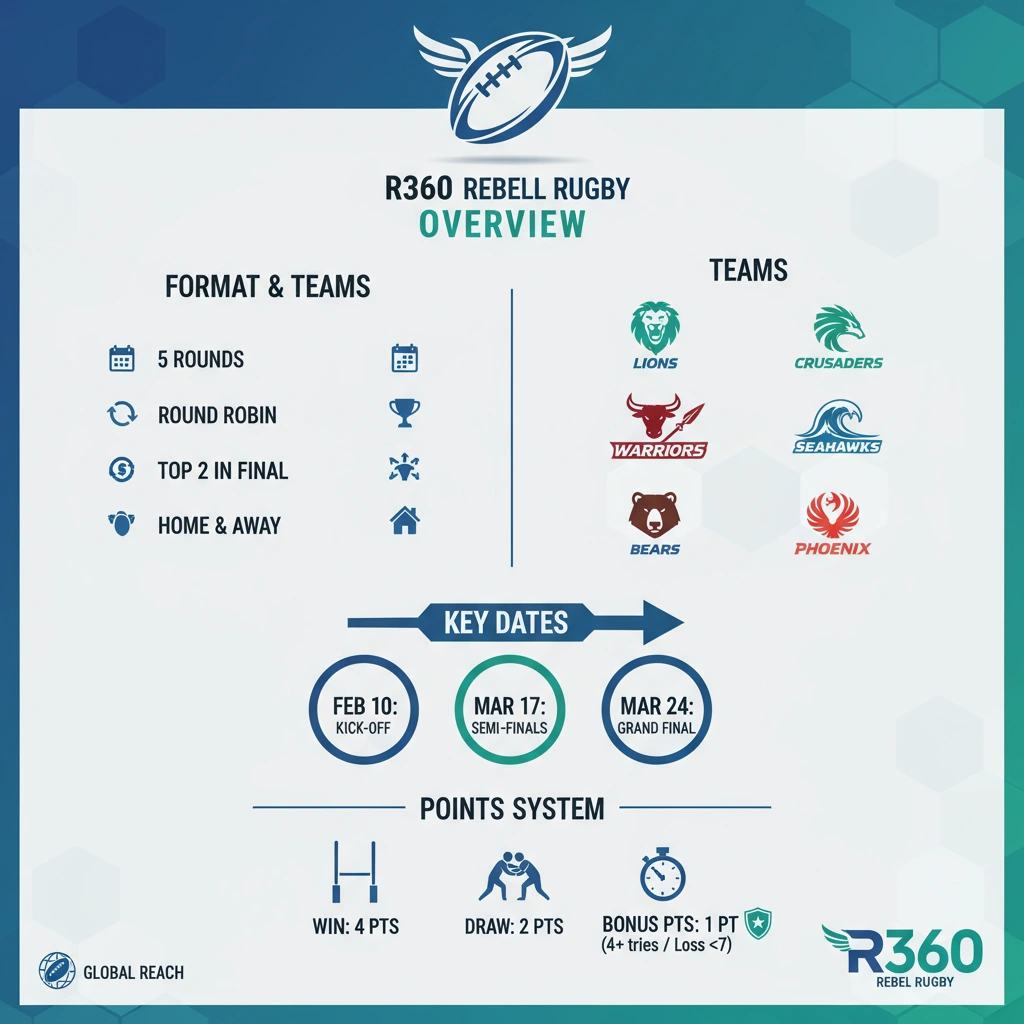R360 is a new rugby union competition set to launch in 2026, promising to reshape rugby’s global landscape. The league will feature eight international franchises in its inaugural season, running from October to December, with plans for expansion in 2027. A key element distinguishes R360: it operates outside traditional governing bodies, targeting a global audience with a format that resembles a worldwide grand prix.
R360’s Structure And Schedule
The competition will feature eight men’s teams and four women’s teams, playing a condensed, festival-style season. R360 intends to hold matches in iconic global venues such as Tottenham Hotspur Stadium in London, Nou Camp in Barcelona, and Morumbi in São Paulo. The season will run in two main windows: April to June and August to September in its second year, with matches held weekly in different cities. This circuit-style format aims to create continuous global engagement similar to Formula One racing.

Overview of R360
Funding And Investment
Funding sources for R360 include private investments and sports-dedicated funds from Saudi Arabia, the United States, and the United Kingdom. Reports confirm that the competition secured all necessary financing for the first three seasons ahead of the planned launch. Investors like Fenway Sports Group, the Glazer family, and Red Bull have shown interest, with franchises valued at around UK£15 million (approximately US$20 million) each. A title sponsorship and broadcast deal are reportedly already in place, possibly involving free-to-air broadcasters.
Player Recruitment And Contracts
R360 aims to attract top rugby talent by offering lucrative contracts reportedly reaching up to US$1 million per season. Around 10 notable players from rugby league—including Ryan Papenhuyzen, Zac Lomax, and Jye Gray—are believed to have committed to the first season. The competition targets elite rugby union players as well, with several England Six Nations stars confirming interest. Organizers seek to finalise contracts shortly, underscoring the league’s commitment to securing marquee talent prior to launch.
Challenges With World Rugby Recognition
The competition faces obstacles from World Rugby, the sport’s global governing body, which has withheld official sanctioning. The league’s founders delayed their formal application to World Rugby to complete the franchising process. The council vote on R360’s approval is now set for June 2026, just months before the expected October start. Without World Rugby’s endorsement, R360 risks issues related to drug testing, insurance, officiating, and player eligibility for international matches.
World Rugby has expressed scepticism about the league’s impact on traditional Test rugby and international windows. Its chief executive affirmed that Test rugby remains the sport’s pinnacle and emphasised the importance of player availability for international fixtures. Nevertheless, World Rugby has shown openness to new investment, provided it enhances the sport’s financial sustainability and ecosystem.
Impact On Existing Competitions And Rugby League
R360 challenges the established rugby calendar and leagues such as the NRL and Super Rugby. The timing of R360’s announcement coincided with significant NRL events, signalling the competition as a direct rival for players and viewers. The ARL Commission chairman has acknowledged R360’s growing threat after initially dismissing it. Up to 10 NRL players have reportedly signed contracts to move across to R360, marking a potential talent migration from rugby league.
The competition also addresses the financial struggles facing rugby clubs worldwide. Several clubs have recently folded due to financial mismanagement, declining investments, and diminishing fan engagement, attributed partly to paywalled broadcast deals. R360 positions itself as a fresh alternative aiming to revitalise rugby through innovation and global reach.
Leadership And Vision
R360’s leadership team includes former England international Mike Tindall, agent Mark Spoors, and Stuart Hooper, previously Bath’s director of rugby. The league’s vision is to grow rugby internationally, focusing on player welfare and safety while appealing to younger audiences. An R360 spokesperson stated, “R360 is designed to help to grow the game we love, put player welfare and safety to the fore, connect with the hundreds of millions of fans who follow international rugby but don’t currently engage with club competitions, and inspire a whole new generation of fans and players.”
The competition’s format, featuring short, intense seasons with global venues, aims to boost rugby’s entertainment value and accessibility. The organisers also plan to create a women’s league to expand the sport’s reach and inclusiveness further.
Looking Ahead
The upcoming months are critical for R360 as it seeks World Rugby’s approval. The competition plans to showcase more details on players, coaches, stadiums, media partners, sponsors, and backers soon. Despite potential regulatory and logistical hurdles, R360’s launch signifies a bold attempt to transform rugby’s international club landscape. Its success could reshape how rugby engages fans and cultivates talent worldwide from 2026 onward.
This development marks a notable moment for rugby enthusiasts, players, and governing bodies alike, as R360’s emergence prompts a reevaluation of traditional rugby structures and the sport’s future trajectory.












